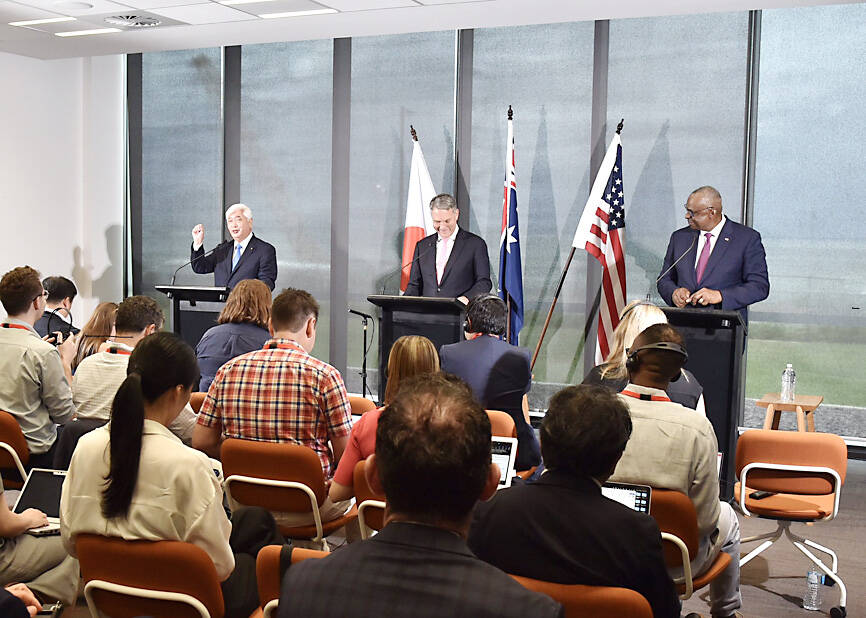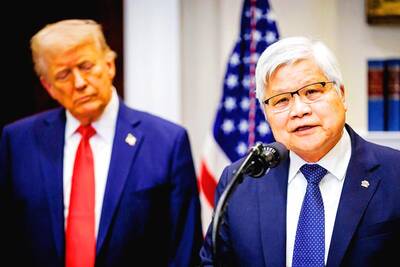Taiwan will continue to strengthen its self-defense capabilities and cooperation with like-minded countries to defend the rules-based international order, the Presidential Office said yesterday after defense ministers from the US, Japan and Australia in a joint statement highlighted the importance of peace and stability across the Taiwan Strait.
The US, Japan and Australia issued the statement after Australian Deputy Prime Minister and Minister for Defense Richard Marles, Japanese Minister of Defense Gen Nakatani and US Secretary of Defense Lloyd Austin convened the 14th Trilateral Defense Ministers’ Meeting in Darwin, Australia, on Sunday.
“We emphasize the importance of peace and stability across the Taiwan Strait and call for the peaceful resolution of cross-strait issues,” the statement said.

Photo: Screen grab from Japan Ministry of Defense’s X account
Taiwan thanks its international partners for placing attention and emphasis on the situation in the Taiwan Strait and the region at large, Presidential Office spokeswoman Karen Kuo (郭雅慧) said.
“The trilateral joint statement once again demonstrates that peace and stability in the Taiwan Strait is not only a critical regional issue, but also an essential element in global peace and prosperity,” she said.
The joint statement also reiterated strong opposition to any unilateral attempts to change the “status quo” in the Taiwan Strait by force or coercion, and showed concern for issues in the East and South China seas.
“We reiterate our serious concern about destabilizing actions in the East and South China seas,” the joint statement said.
“It is important that all states are free to exercise rights and freedoms consistent with international law, particularly the United Nations Convention on the Law of the Sea, including freedom of navigation and overflight and other lawful uses of the sea,” it added.
Kuo said Taiwan stands on the frontline of defense for democracy and is a responsible member of the region, as well as the international community.
“Facing an increasingly complex regional situation, Taiwan will continue to strengthen its self-defense capabilities and deepen its cooperative partnerships with the US, Japan, Australia and other like-minded countries to jointly defend the rules-based international order,” she added.
Additional reporting by Lee I-chia

ENDEAVOR MANTA: The ship is programmed to automatically return to its designated home port and would self-destruct if seized by another party The Endeavor Manta, Taiwan’s first military-specification uncrewed surface vehicle (USV) tailor-made to operate in the Taiwan Strait in a bid to bolster the nation’s asymmetric combat capabilities made its first appearance at Kaohsiung’s Singda Harbor yesterday. Taking inspiration from Ukraine’s navy, which is using USVs to force Russia’s Black Sea fleet to take shelter within its own ports, CSBC Taiwan (台灣國際造船) established a research and development unit on USVs last year, CSBC chairman Huang Cheng-hung (黃正弘) said. With the exception of the satellite guidance system and the outboard motors — which were purchased from foreign companies that were not affiliated with Chinese-funded

PERMIT REVOKED: The influencer at a news conference said the National Immigration Agency was infringing on human rights and persecuting Chinese spouses Chinese influencer “Yaya in Taiwan” (亞亞在台灣) yesterday evening voluntarily left Taiwan, despite saying yesterday morning that she had “no intention” of leaving after her residence permit was revoked over her comments on Taiwan being “unified” with China by military force. The Ministry of the Interior yesterday had said that it could forcibly deport the influencer at midnight, but was considering taking a more flexible approach and beginning procedures this morning. The influencer, whose given name is Liu Zhenya (劉振亞), departed on a 8:45pm flight from Taipei International Airport (Songshan airport) to Fuzhou, China. Liu held a news conference at the airport at 7pm,

KAOHSIUNG CEREMONY: The contract chipmaker is planning to build 5 fabs in the southern city to gradually expand its 2-nanometer chip capacity Taiwan Semiconductor Manufacturing Co (TSMC, 台積電), the world’s biggest contract chipmaker, yesterday confirmed that it plans to hold a ceremony on March 31 to unveil a capacity expansion plan for its most advanced 2-nanometer chips in Kaohsiung, demonstrating its commitment to further investment at home. The ceremony is to be hosted by TSMC cochief operating officer Y.P. Chyn (秦永沛). It did not disclose whether Premier Cho Jung-tai (卓榮泰) and high-ranking government officials would attend the ceremony. More details are to be released next week, it said. The chipmaker’s latest move came after its announcement earlier this month of an additional US$100 billion

Authorities yesterday elaborated on the rules governing Employment Gold Cards after a US cardholder was barred from entering Taiwan for six years after working without a permit during a 2023 visit. American YouTuber LeLe Farley was barred after already being approved for an Employment Gold Card, he said in a video published on his channel on Saturday. Farley, who has more than 420,000 subscribers on his YouTube channel, was approved for his Gold Card last month, but was told at a check-in counter at the Los Angeles International Airport that he could not enter Taiwan. That was because he previously participated in two